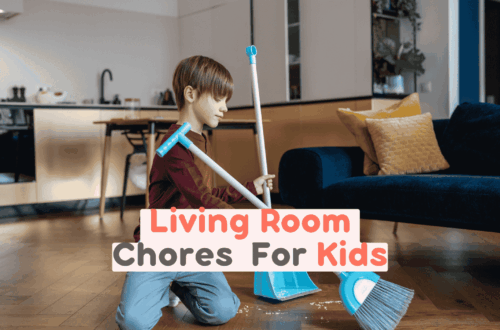Getting kids to help around the house can feel like a never-ending battle. Parents often find themselves repeating the same requests, raising their voices, or giving up altogether. But chores do not have to be a fight. With the right approach, and a little help from technology, you can motivate kids to do chores without nagging and transform household tasks into activities that feel fun, rewarding, and drama-free.
The Problem with Traditional Chore Assignments
Most kids resist chores because they see them as boring, pointless, or unfair. Simply telling them “because I said so” rarely inspires effort. Without a sense of accomplishment or reward, motivation quickly disappears. This is when nagging starts, which only makes chores more stressful for everyone.
Why Rewards Help Motivate Kids to Do Chores
Positive reinforcement taps into a child’s natural desire for recognition and achievement. Rewards do not need to be expensive or material. Some of the most effective motivators are simple privileges such as:
- Extra screen time
- Choosing dinner for the family
- Picking the movie for family night
- Staying up a little later on the weekend
When kids clearly see the connection between effort and reward, they begin to view chores as meaningful contributions rather than punishments.
👉 For more inspiration on how to motivate kids to do chores with creative rewards, check out our article on Creative Reward Ideas for Kids Completing Chores.
Turning Chores into a Game: Fun Ways to Motivate Kids
Kids love challenges, which is why gamification is so effective. By turning chores into a game, you make responsibility exciting rather than dull.
Ways to gamify chores include:
- Assigning point values to tasks
- Using charts or apps to track progress visually
- Allowing children to redeem points for privileges
This approach not only gets chores done but also teaches valuable life skills like goal setting and time management.
Kikaroo makes this simple. With its built-in points system, colorful progress tracking, and customizable rewards, parents can turn daily tasks into a fun routine that kids look forward to.
👉 Want to make chores more fun? Explore our Complete Guide to Chore Charts and Tools to discover new ways to keep kids motivated.
Why Consistency Matters When Motivating Kids
Even the best system will fail without consistency. Rewards should always follow the rules you set, otherwise kids lose trust in the process.
A digital tool like Kikaroo helps families stay consistent by:
- Assigning chores automatically
- Sending reminders directly to kids
- Tracking progress in real time
- Making rewards transparent and fair
Consistency helps chores become a normal part of family life instead of a constant battle.
👉 If you’re looking for more strategies to motivate kids to do chores without arguments, visit our Parenting Tips to Make Chores Easier.
Building Long-Term Responsibility Through Chores
The real purpose of chores is not just getting the house clean. It’s about teaching children the importance of contributing to the family. Over time, kids begin to take pride in their efforts and may even start helping without being asked.
According to the Child Mind Institute, involving children in regular household tasks builds responsibility, confidence, and essential life skills. With positive reinforcement and a reliable system, chores can become lifelong habits that foster independence and maturity.
With tools like Kikaroo, parents can make this process easier, tracking tasks, setting fair rewards, and celebrating progress in a way that keeps kids motivated.
👉 Not sure which tasks to assign? Our Complete Guide to Age-Appropriate Chores for Kids shows how to motivate kids to help at home, no matter their age.
Conclusion: Making Chores Work for Everyone
Motivating your children consistently can be challenging, but when you use the right tools and strategies, it becomes second nature. With Kikaroo, it’s easier than ever to motivate kids to do chores, track their progress, and celebrate achievements, all while building lifelong habits of responsibility and teamwork.
The Kikaroo app was designed to make this effortless. With ready-made age-based templates, built-in reward tracking, and easy progress monitoring, it helps families build habits that last.
👉 Ready to make parenting easier? Visit the Kikaroo’s chore app for families and start your journey today.
Frequently Asked Questions
1. How can I motivate my kids to do chores without arguments?
The best way is to focus on positive reinforcement instead of punishment. Create small, consistent rewards for completed chores, like extra screen time or choosing family activities. Apps like Kikaroo make this process easy by tracking progress and rewards automatically.
2. What are some fun ways to motivate kids to do chores?
Gamify tasks! Turn cleaning into a challenge, set up a points system, or use colorful chore charts. This helps transform chores into fun, achievable goals that keep kids engaged.
3. At what age should kids start doing chores?
Children as young as two can start with simple, safe tasks such as putting toys away. As they grow, you can assign age-appropriate chores. See our Complete Guide to Age-Appropriate Chores for Kids for a detailed list.
4. Should I give my kids money for doing chores?
Allowances can work if used thoughtfully. The key is connecting effort with responsibility, not bribery. Even non-monetary rewards like praise, stickers, or special privileges can effectively motivate kids to do chores.
5. How can I stay consistent with chore rewards?
Use digital tools such as Kikaroo, which sends reminders, tracks completed chores, and helps parents deliver rewards fairly and on time, ensuring consistency and long-term success.
👉 Explore more parenting tips:

 Home
Home Features
Features Testimonials
Testimonials Downloads
Downloads FAQ
FAQ Blog
Blog







